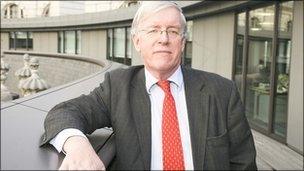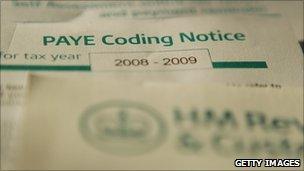Revenue's Hartnett apologises over unexpected tax bills
- Published

Dave Hartnett told the BBC there had been no blunders.
The UK's top tax official has apologised to the 1.4 million people facing an unexpected tax bill.
HM Revenue and Customs Permanent Secretary Dave Hartnett told those who will have to pay an average of £1,428 each he was "deeply sorry".
Earlier Mr Hartnett had told the BBC he "saw no need" to apologise as tax reconciliation was a routine measure.
But his remarks drew wide criticism from MPs, coalition government sources, pressure groups and taxpayers.
In a statement, Mr Hartnett said: "I apologise if my remarks came across as insensitive.
"I am working flat out with my colleagues to ensure everyone's tax is correct and the new computer system will help us do this.
"It was this new system that revealed the extent and size of reconciliations required and will help us be more accurate in future but we do not underestimate the distress caused to taxpayers and once again I apologise."
Millions affected
Earlier, in an interview with the BBC's Money Box programme, Mr Hartnett had said he was "not sure" he saw a need to apologise.
He added: "I've read the papers, listened to the media and heard stories of HMRC blunder and IT failure. Neither of those are true.
"Every country that I know of that has deduction of tax from wages in salaries has to do a reconciliation at the end of each year and we're doing one."
Asked if the numbers involved were extraordinary - with 4.3m people having paid too much tax and 1.4 million having to pay money back after paying too little, he said: "I don't think they are extraordinary. There is a need for reconciliation every year.
"Once or twice in the past the numbers have been very large, sometimes they're less. It depends on how the system has been operating and what issues there have been."
Following Mr Hartnett's comments a coalition government source told the BBC Mr Hartnett could and should have explained himself more clearly when pointing out that tax reconciliation happens every year.
The source said ministers have made it clear in Parliament that the HMRC has been told to treat cases of hardship sympathetically and give people more time to repay arrears - up to three years.
It is estimated 2.3 million people underpaid income tax during the past two tax years due to errors in their Pay As You Earn (PAYE) tax code.
The mistakes were made because of miscalculations made by HMRC tax officials.
About 900,000 taxpayers will not have to pay anything after the government raised the write-off threshold from £50 to £300, leaving 1.4 million people owing about £2bn, or £1,428 each on average.
Mr Hartnett's comments also drew fire from Conservative MP and chairman of the All Party Parliamentary Taxation Group, Ian Liddell-Grainger, who said the HMRC was "one of these organisations that's grown and grown".
"They aren't actually up to it.
"You get this built-in arrogance we're hearing, where 'I don't need to apologise because I've not done anything wrong'.
"It is a mistake. We have been warning for a long time that structurally this is not up to it. It comes down to a 21st Century computer system and a 1940s PAYE system."
And John Andrews, chairman of the Low Incomes Tax Reform Group, said: "The £2,000 procedure gives me concern.
"There are circumstances in which over a two-year period, for example on a bereavement where a widow suddenly inherits part of her late husband's pension, it is quite easy to run up this amount.
"I hope that HMRC would live up to the Your Charter expectations and look at individuals."
BBC News Website readers also voiced their anger, one writing: "HMRC should apologise - it is HMRC who calculate our taxes and who deduct them from our wages, so if a mistake has been made who is to blame?"

Some taxpayers can expect more letters and tax returns from HMRC in the coming months
Mr Hartnett had earlier defended himself against criticism that those owing more than £2,000 would have to repay the money more quickly.
People owing less than £2,000 will be able to pay the money in monthly instalments taken from their salary over one to three years. Those owing more money will have three months to return it, once a self-assessment form has been issued.
Mr Hartnett had said for those owing the most it "may actually mean they're earning the most".
Mr Hartnett said the 5.7 million letters going out to taxpayers before Christmas were the result of a normal process of matching the tax deducted from each taxpayer with their circumstances.
'Atrocious' system
His comments come amid reports of difficulties at HMRC.
Last week an unnamed tax officer told the BBC the department had not been fit for purpose for a very long time and had reached "melting point" without the staff or resources needed and subject to an "atrocious" computer system.
HMRC responded by saying the introduction of a new computer system would help reduce tax errors in future.
A spokesman said help was available to all people ordered to pay back tax, including those owing more than £2,000.
Payments could be spread over a longer period with Revenue agreement but interest would still be due on the outstanding balance.
Three quarters of those sent a letter will receive a rebate averaging £400.
The rest will be told they have to pay extra tax. Up to 250,000 could be asked for £2,000 or more.
BBC Radio 4's Money Box , externalis broadcast on Saturdays at 1200 BST, and repeated on Sundays at 2100 BST. Or listen again on BBC iPlayer.
BBC News website readers have been sending reaction to this story. Here is a selection of their comments:
Why can't the people who messed up in the first place do the work to put it right painlessly? And as for these officials who seem to think it's OK to make huge blunders and get away with it, they should be sacked and their gold plated pensions withdrawn. Ian Cooper, Bromsgrove
How can he now be "deeply sorry" when he earlier stated he saw no need to apologise. Hopefully there will be no bonuses for him or anyone else working under him until they sort this mess out. David Buchanan, Hamilton
Well that's convenient. He's only apologising because if he doesn't he's facing masses of angry people. An apology made out of cowardice isn't much of an apology at all. Jennifer H, Glasgow
Unless I'm misreading his comments, it would seem he is apologising for his earlier statement and NOT for the mistake itself. Pretty bad show. Mark Dooney, Milton Keynes
If any other business had made mistakes like this one they would have to swallow the deficit themselves. I see no reason why this shambles of an outfit should be treated in any other way. It is their mistake, they should pay the penalties! Nigel Lawrence, Redruth, UK
Making an apology now is pointless and insincere. We have all got to pay our taxes, and the new system has identified problems with the last system which should at least mean that problems in the future will be less severe. However the attitude over "time to pay" from Mr Hartnett was insensitive and would have caused unnecessary anxiety for those that receive a letter. I just hope I don't get one! Brian Hunt, Lincoln
- Published11 September 2010
- Published11 September 2010
- Published9 September 2010
- Published4 September 2010
- Published7 September 2010